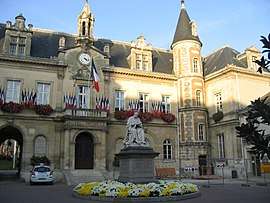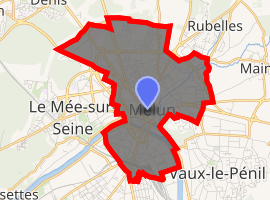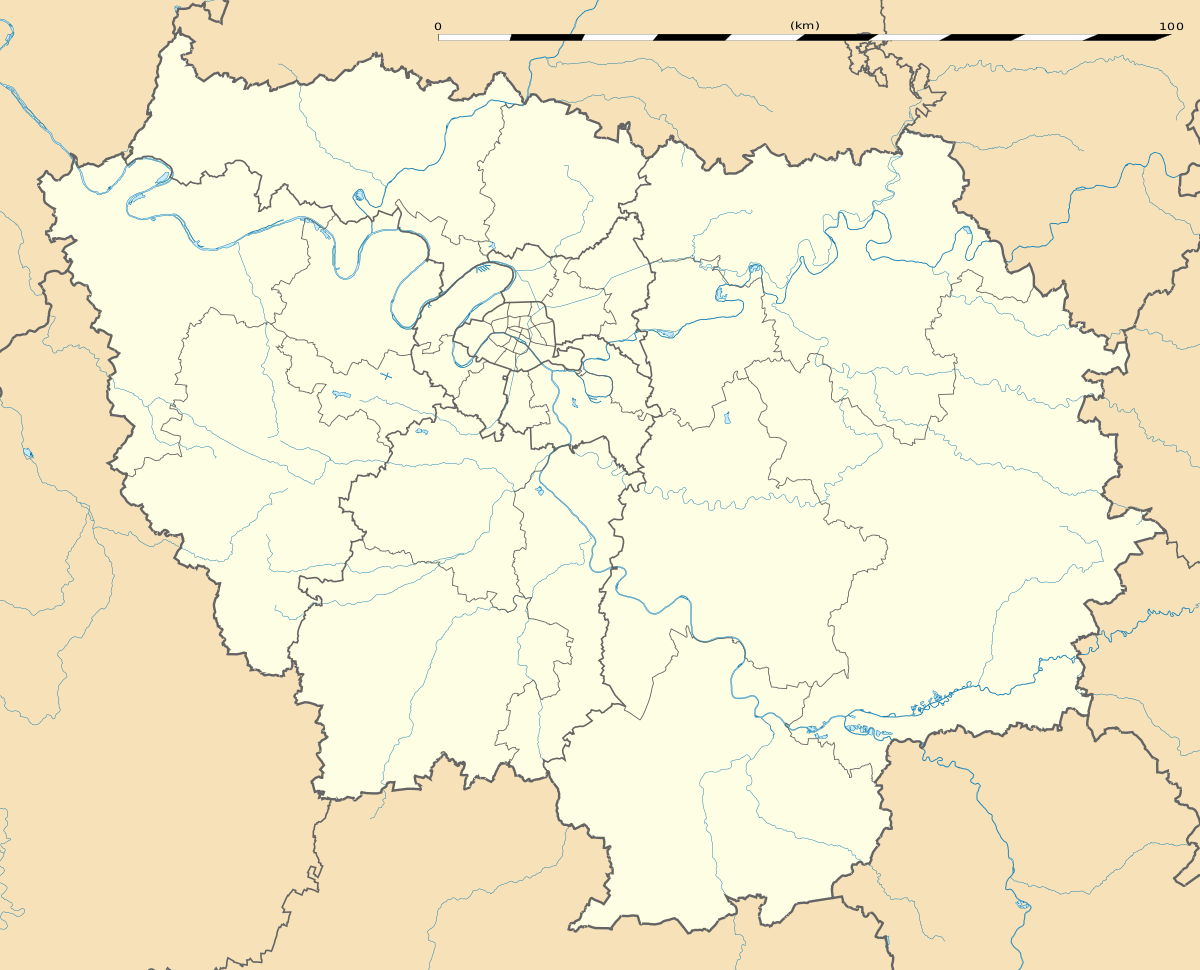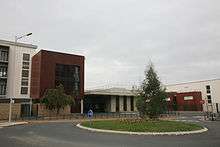Melun
Melun (French pronunciation: [məlœ̃] (![]()
Melun | |
|---|---|
Prefecture and commune | |
 Town hall | |
.png) Coat of arms | |
 Location (in red) within Paris inner and outer suburbs | |
Location of Melun 
| |
 Melun Location (in red) within Paris inner and outer suburbs  Melun Melun (Île-de-France (region)) | |
| Coordinates: 48°32′26″N 2°39′36″E | |
| Country | France |
| Region | Île-de-France |
| Department | Seine-et-Marne |
| Arrondissement | Melun |
| Canton | Melun |
| Intercommunality | CA Melun Val de Seine |
| Government | |
| • Mayor (2016–2020) | Louis Vogel (LR) |
| Area 1 | 8.04 km2 (3.10 sq mi) |
| Population (2017-01-01)[1] | 40,032 |
| • Density | 5,000/km2 (13,000/sq mi) |
| Time zone | UTC+01:00 (CET) |
| • Summer (DST) | UTC+02:00 (CEST) |
| INSEE/Postal code | 77288 /77000 |
| Elevation | 37–102 m (121–335 ft) (avg. 54 m or 177 ft) |
| 1 French Land Register data, which excludes lakes, ponds, glaciers > 1 km2 (0.386 sq mi or 247 acres) and river estuaries. | |
History
Meledunum began as a Gaulish town; Caesar noted Melun as "a town of the Senones, situated on an island in the Seine"; at the island there was a wooden bridge, which his men repaired.[2] Roman Meledunum was a mutatio where fresh horses were kept available for official couriers on the Roman road south-southeast of Paris, where it forded the Seine.[3] Around 500 A.D, Clovis I granted Melun to a Gallo-Roman magnate, Aurelianus, who had fought for Clovis several times and apparently influenced his conversion to Christianity.[4]
The Normans sacked it in 845. The castle of Melun became a royal residence of the Capetian kings. Hugh Capet (See also: House of Capet) gave Melun to Bouchard, his favorite. In the reign of Hugh's son, Robert II of France, Eudes, the count of Champagne, bought the city, but the king took it back for Bouchard in 999. The chatelain Gautier and his wife, who had sold the city, were hanged; Eudes escaped. Robert died there in July 1031.
Robert of Melun (c. 1100 – 27 February 1167) was an English scholastic Christian theologian who taught in France, and later became Bishop of Hereford in England. He studied under Peter Abelard in Paris before teaching there and at Melun, which gave him his surname.
In July 1415, Melun was besieged by King Henry V of England, who had recently signed the Treaty of Troyes with King Charles VI of France. The town was in the hands of the Dauphin, later Charles VII of France, who had been dispossessed by the treaty. The defenders were led by Arnaud Guillaume, seigneur de Barbazan, and fought off the besiegers for fourteen weeks before capitulating.[5] The town was liberated by Joan of Arc on April 17, 1430.
Counts of Melun
- Aurelianus (c. 500)
- Donatus (?-834)
- Bouchard I (956/967–1005), also Count of Vendôme and Count of Paris
Viscounts of Melun
The early viscounts of Melun were listed by 17th and 18th century genealogists, notably Père Anselme. Based on closer reading of the original documents, Adolphe Duchalais constructed this list of viscounts in 1844:[6]
- Salo (c. 993; possibly legendary)
- Joscelin I (c. 998)
- William (possibly c. 1000)
- Ursio (c. 1067–1085)
- William the Carpenter (c. 1094)
- Hilduin, Garin, Ursio II, Jean (unknown dates, possibly not viscounts)
- Adam (c. 1138–1141; married Mahaut, daughter of his predecessor)
- Joscelin II (c. 1156)
The title eventually became an honorary peerage. Such viscounts include Honoré Armand de Villars and Claude Louis Hector de Villars.
Climate
| Climate data for Melun (1981–2010 averages) | |||||||||||||
|---|---|---|---|---|---|---|---|---|---|---|---|---|---|
| Month | Jan | Feb | Mar | Apr | May | Jun | Jul | Aug | Sep | Oct | Nov | Dec | Year |
| Record high °C (°F) | 16.9 (62.4) |
21.2 (70.2) |
25.6 (78.1) |
29.5 (85.1) |
31.2 (88.2) |
36.8 (98.2) |
39.4 (102.9) |
38.9 (102.0) |
33.8 (92.8) |
29.4 (84.9) |
22.1 (71.8) |
17.6 (63.7) |
39.4 (102.9) |
| Average high °C (°F) | 6.4 (43.5) |
7.8 (46.0) |
12.0 (53.6) |
15.3 (59.5) |
19.3 (66.7) |
22.5 (72.5) |
25.2 (77.4) |
25.0 (77.0) |
21.1 (70.0) |
16.2 (61.2) |
10.3 (50.5) |
6.8 (44.2) |
15.7 (60.3) |
| Average low °C (°F) | 1.0 (33.8) |
1.0 (33.8) |
3.1 (37.6) |
5.0 (41.0) |
8.8 (47.8) |
11.6 (52.9) |
13.5 (56.3) |
13.2 (55.8) |
10.4 (50.7) |
7.8 (46.0) |
3.9 (39.0) |
1.8 (35.2) |
6.8 (44.2) |
| Record low °C (°F) | −19.8 (−3.6) |
−19.7 (−3.5) |
−10.3 (13.5) |
−4.6 (23.7) |
−2.1 (28.2) |
1.6 (34.9) |
4.0 (39.2) |
3.5 (38.3) |
0.4 (32.7) |
−4.8 (23.4) |
−9.3 (15.3) |
−14.8 (5.4) |
−19.8 (−3.6) |
| Average precipitation mm (inches) | 55.1 (2.17) |
47.6 (1.87) |
51.0 (2.01) |
53.7 (2.11) |
64.6 (2.54) |
53.9 (2.12) |
61.3 (2.41) |
53.4 (2.10) |
56.1 (2.21) |
63.6 (2.50) |
55.2 (2.17) |
61.4 (2.42) |
676.9 (26.65) |
| Average precipitation days | 11.0 | 9.9 | 10.6 | 9.8 | 10.8 | 8.7 | 8.2 | 7.8 | 8.4 | 9.9 | 10.6 | 11.4 | 117.2 |
| Average relative humidity (%) | 88 | 83 | 79 | 73 | 75 | 74 | 73 | 74 | 78 | 85 | 88 | 89 | 79.9 |
| Mean monthly sunshine hours | 62.6 | 79.6 | 136.5 | 178.3 | 211.7 | 226.5 | 229.3 | 221.7 | 174.8 | 118.0 | 65.4 | 48.2 | 1,752.5 |
| Source 1: Météo France[7][8] | |||||||||||||
| Source 2: Infoclimat.fr (humidity, 1961–1990)[9] | |||||||||||||
Transport

Melun is served by the Gare de Melun, which is an interchange station on Paris RER line D, on the Transilien R suburban rail line, and on several national rail lines.
Main sights
The Collegiate Church of Notre-Dame, Melun was the original home of the Melun Diptych.
The nearby château of Vaux-le-Vicomte is considered a smaller predecessor of Palace of Versailles.
The officers' school of the French Gendarmerie is located in Melun.
People
Melun is the birthplace of:
- Morgan Ciprès, pair skater
- Jérémie Bela, footballer
- Willy Boly, footballer
- Pierre Certon (c.1510-1520-1572), composer of the Renaissance (probably born in Melun)
- Jacques Amyot (1513–1593), writer
- Chimène Badi (1982–), singer
- Samir Beloufa (1979–), professional footballer
- Raphaël Desroses, basketball player
- Khamis Digol, footballer
- Stéphane Dondon, basketball player
- Judah of Melun (13th century), French rabbi and tosafist
- Yvan Kibundu, footballer
- Godson Kyeremeh, footballer
- Edmé-François Mallet (1713–1755), theologian and encyclopédiste
- Steven Mouyokolo, footballer
- Granddi Ngoyi, footballer
- Yrétha Silété, figure skater
- Oumar Solet, footballer
- Bertrand Grospellier (1981–), poker player
- William the Carpenter, viscount of Melun in the 11th century
Education

A campus of the École nationale de l'aviation civile (French civil aviation university) is located in Melun.
Public high schools/sixth form colleges:[10]
- Lycée Léonard de Vinci
- Lycée Jacques-Amyot
- Lycée Georges Sand
There is one private high school/sixth form college:[10]
- Lycée Saint Aspais
Twin towns – sister cities
Melun is twinned with:[11]



References
- "Populations légales 2017". INSEE. Retrieved 6 January 2020.
- Gallic War vii. 58, 60.
- Meledunum appears in the Antonine Itinerary almost halfway between Lutetia (Paris) and Condate (Rennes) ('Meledunum").
- Bachrach, Bernard S. (1972). Merovingian Military Organization, 481-751. U of Minnesota Press. p. 15. ISBN 9780816657001.
- The Field of Mars: Being an Alphabetical Digestion of the Principal Naval and Military Engagements, in Europe, Asia, Africa, and America. J. Macgowan. 1801. p. 226.
- Adolphe Duchalais, "Charte inedité de l’an 1138, relative à l’histoire des viscomtes de Melun" (Bibliothèque de l’école des chartes vol. 6 no. 6, 1845).
- "Données climatiques de la station de Melun" (in French). Meteo France. Retrieved 5 January 2015.
- "Climat Île-de-France" (in French). Meteo France. Retrieved 5 January 2016.
- "Normes et records 1961-1990: Melun - Villaroche (77) - altitude 91m" (in French). Infoclimat. Retrieved 5 January 2016.
- "Liste des établissements scolaires Archived 21 September 2016 at the Wayback Machine." Melun. Consulté le 29 août 2016.
- "Jumelage". ville-melun.fr (in French). Melun. Retrieved 19 November 2019.
Sources
- Initial text from the "Carpenters' Encyclopedia of Carpenters 2001" Compiled by John R. Carpenter.
- The Viscounts and Counts of Melun are listed in Detlev Schwennicke, Europäische Stammtafeln, Neue Folge, Volume VII, Tafels 55 & 56.
External links
| Wikimedia Commons has media related to Melun. |
| Wikisource has the text of the 1911 Encyclopædia Britannica article Melun. |
- Cawley, Charles, Paris Region Nobility - Vicomtes de Melun, Medieval Lands database, Foundation for Medieval Genealogy
- Official website (in French)
- Tourist office website (in French)
- 1999 Land Use, from IAURIF (Institute for Urban Planning and Development of the Paris-Île-de-France région) (in English)
- French Ministry of Culture list for Melun (in French)